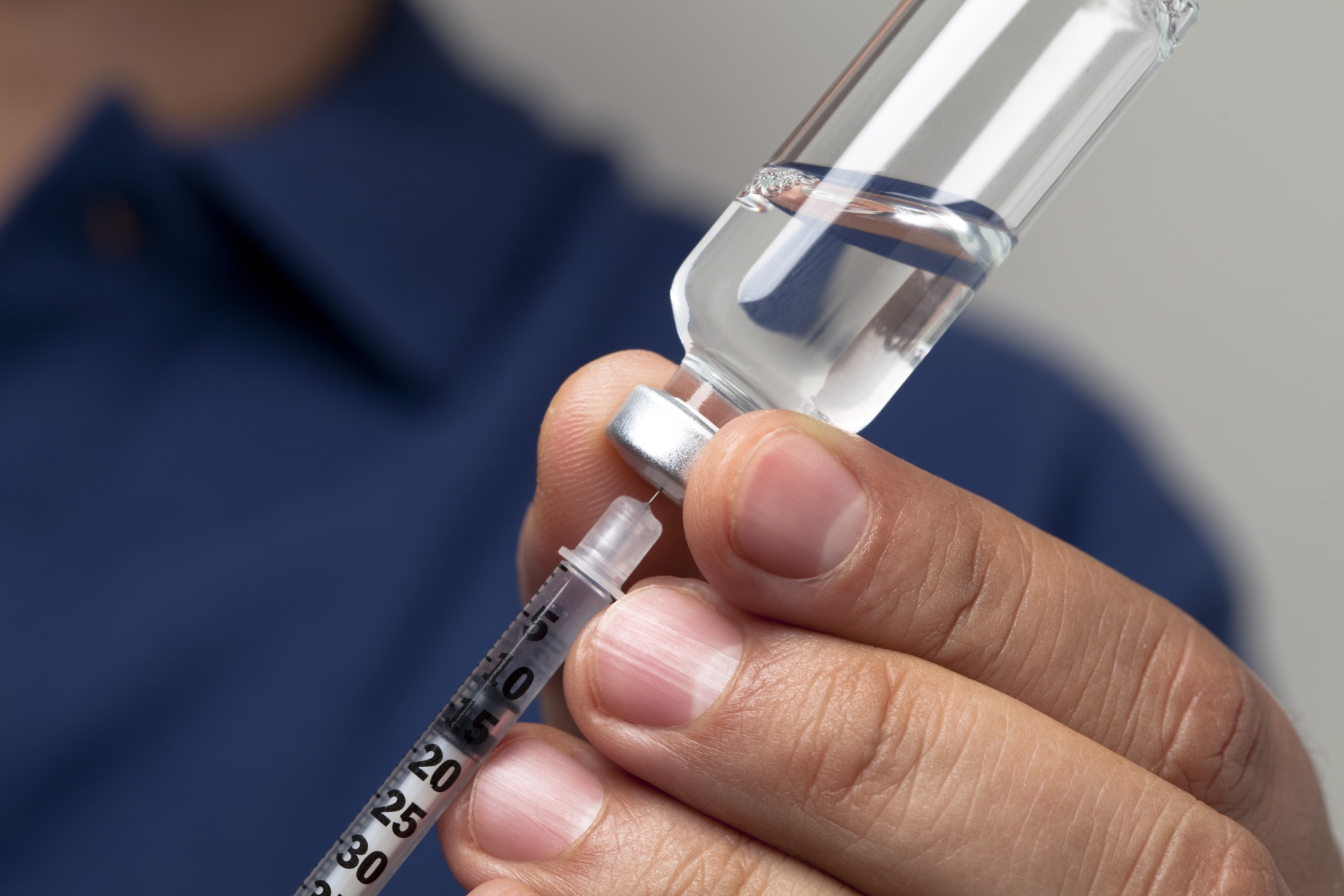A new study shows the drug, verapamil, appears to protect pancreatic cells that produce insulin.

Regular injections of insulin are used to treat Type 1 diabetes. But there might be another option.Marcela Barsse / Getty Images
A cheap and safe blood pressure drug slows the worsening of Type 1 diabetes, researchers reported Monday.
It’s the first drug that has been shown to affect the course of the disease, also known as juvenile diabetes, which is caused by the body’s mistaken destruction of the pancreatic cells that make insulin.
The treatment is regular injections of insulin. People with Type 1 diabetes must regularly check their blood sugar and administer insulin throughout the day. Uncontrolled blood sugar can damage blood vessels and organs, and can kill people suddenly.
The blood pressure drug, verapamil, appears to protect some of the pancreatic cells that are damaged, allowing them to continue producing a little insulin. It’s not a cure, but adults with newly diagnosed diabetes who took the drug had better control of their blood sugar over time, the team at the University of Alabama at Birmingham reported.
“This will have to be proven in a larger population and also in other age groups. We also would like to extend it to children,” Dr. Anath Shalev, director of the diabetes center at the university, said in an interview.
Verapamil is a drug that lowers blood pressure and in a class called calcium channel blockers. Some doctors had reported that patients who took it to treat blood pressure had a lower risk of developing Type 2 diabetes. Tests in mice showed that it could help preserve the insulin-producing beta cells in the pancreas, and that it could reverse diabetes in some of the animals.
So Shalev’s team tried the drug out in a small group of adults newly diagnosed with Type 1 diabetes.
“Although it is often diagnosed in children and young adults, Type 1 diabetes can occur at any age and, in contrast to what was previously thought, many patients retain a small number of functioning beta cells even years after diagnosis,” Shalev’s team wrote in their report, published in Nature Medicine.
The more common Type 2 diabetes is linked with genetic predisposition but can also be associated with poor diet, a lack of exercise and weight gain.
“The natural disease course is a constant, especially in that first year, a pretty rapid decline in beta cell function,” Shalev told NBC News. “Being able to slow that would be a major improvement. Even a small amount of beta cell mass makes a major impact on function.”
The team conducted what’s considered the strongest type of medical study: one in which patients were randomly assigned to either get treatment or a sugar pill, and in which neither the patients nor the doctors treating them knew who was getting which. Eleven volunteers got verapamil pills for a year and whatever insulin they needed, and 13 got insulin and sugar pills.
Elon Musk proposes plan to help the trapped Thailand soccer team
“In addition, verapamil treatment was well tolerated, was not associated with any clinically significant adverse events and seemed to be effective even when added by itself to a standard insulin regimen,” the team wrote.
The findings suggest that verapamil helps stop the ongoing damage to the pancreas caused by Type 1 diabetes, Shalev said.
That’s probably because the drug directly affects cells in the pancreas, she added. Beta cells, which produce insulin in the pancreas, have the same structures, called calcium channel receptors, that heart cells do.
Because Type 1 diabetes is believed to be caused by immune system mistakes, some researchers are testing immune-suppressing drugs to try to treat it — something that can raise the risk of infections and cancer.
Other groups are trying transplants of the pancreatic cells that produce insulin, but only a small number of patients can get this treatment because of a shortage of donors. The benefits may also not be permanent.
“We are always looking for drugs or therapies that will alter the course of Type 1 diabetes and protect or bring back the insulin producing beta cells,” said Andrew Rakeman of JDRF, the diabetes research and advocacy organization that helped fund the study.
“We are very excited about the results from Dr. Shalev’s team showing that reducing stress in the beta cells with verapamil can slow down progression of Type 1 diabetes.”

Gov. Henry McMaster speaks at Coastal Carolina University on June 23 in Conway, South Carolina.Richard Shiro / AP
South Carolina Gov. Henry McMaster has removed $16 million for health care from the state budget, saying he wants to make sure that no taxpayer money goes to abortion providers.
The Republican governor said he was keeping a promise he has made repeatedly as he campaigns for a full term. Planned Parenthood was set to receive less than $100,000 of the money, and all of it goes for family planning, not abortion.
“I have stated many times I am opposed to what Planned Parenthood is doing. And the veto I have is the most direct way,” McMaster said at a news conference Friday after issuing 42 vetoes cutting about $36 million from South Carolina’s $8 billion spending plan.
Planned Parenthood said the veto is a “political stunt” and the practical effect will be to remove birth control, testing for sexually transmitted diseases and even cancer screenings by thousands of federally approved family planning providers for poor women on Medicaid.
“It’s clear that the governor is singularly focused on his election bid in November and that is at the expense of South Carolina women. The veto does not ‘defund’ Planned Parenthood, but it will ensure that South Carolinians who use Medicaid as their primary insurance will be unable to access affordable, basic health care,” Planned Parenthood spokeswoman Vicki Ringer said in a statement.
Republicans have been fighting over the “family planning” line in the budget for months. McMaster did not veto the entire $34 million in the item. His office said eliminating all that money would keep 700,000 women and children from getting prescriptions through Medicaid.Democrats and some Republicans — even those adamantly against abortions — said removing the money from the budget was shortsighted because so little goes to Planned Parenthood in the first place and removing it from the spending plan could mean less money for needs like law enforcement or help for families with autistic children.
“You are voting for a budget with an illusion at the expense of a reality,” said Rep. Kirkman Finlay, R-Columbia, during last month’s debate.
McMaster said he would prefer that the federal government approve his request for a waiver that would allow South Carolina to withhold any public funds from Planned Parenthood. But his office does not know when that might be considered.
Some Republicans threatened to toss out the entire budget because the money remained after a conference committee vote — the House took it out, while the Senate put it back in. But legislators at the time pointed out that it would take a two-thirds vote to override the veto. In the Senate, 12 Republicans would have to join the 18 Democrats, and in the House, 40 Republicans would have to join 44 Democrats if everyone is present to put the money back in the budget.
“I’m sure they should be sustained,” McMaster said of his vetoes. “Whether they will be is another question.”Legislative leaders said they were reviewing the vetoes and had not decided when or if they would return to Columbia, the state capital, to consider them.





